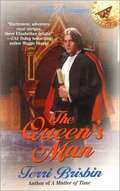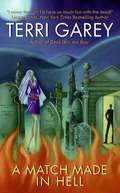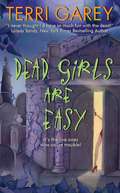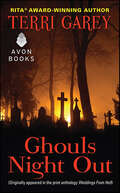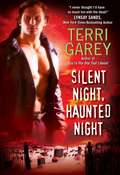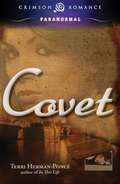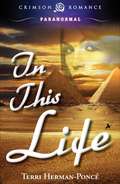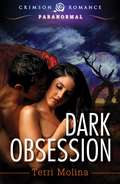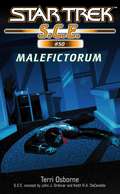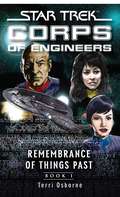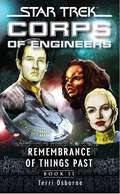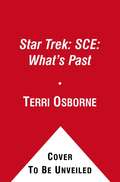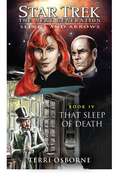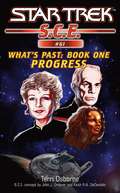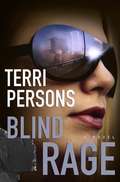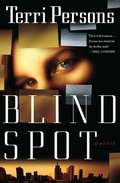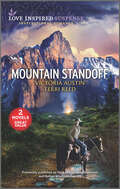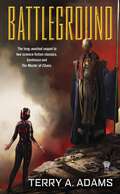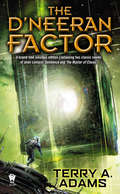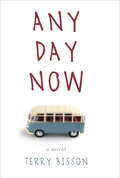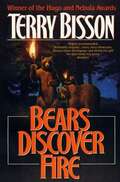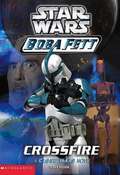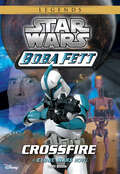- Table View
- List View
The Queen's Man
by Terri BrisbinModern day textiles expert Sharon Reynolds discovers a bit of parchment with an astounding piece of information regarding the true heir to Henry VIII's throne. Before she knows it, she is swept back in time and into the arms of Richard Grenville, Queen Elizabeth's stable master -- and the man who should be king.
A Match Made in Hell
by Terri GareyA brush with death and a brief trip to the hereafter left vintage clothing store owner Nicki Styx an unwilling ghoulfriend to the dead. She can see and hear spirits, and boy, do they want to be heard! Luckily, her new boyfriend, sexy doc Joe Bascombe, is there to help, especially when Nicki faces her latest ghost, a woman in pink sequins who holds the key to some family secrets. Unfortunately for Nicki, it turns out that there are more skeletons in the family closet than she thought, including a twin sister and a mysterious house full of spirits and surprises. Things go from bad to worse when the devil himself shows up, determined to lure Nicki from Joe's side. Will she give in to temptation and sell her soul (or someone else's) for one incredible night? Demons may be a ghoul's best friend, but with this particular hottie, it could be a match made in hell!
Dead Girls Are Easy
by Terri GareyThere's something about almost dying that makes a girl rethink her priorities. Take Nicki Styx--she was strictly goth and vintage, until a brush with the afterlife leaves her with the ability to see dead people. Before you can say boo, Atlanta's ghosts are knocking at Nicki's door. Now her days consist of reluctantly cleaning up messes left by the dearly departed, leading ghouls to the Light . . . and one-on-one anatomy lessons with Dr. Joe Bascombe, the dreamy surgeon who saved her life. All this catering to the deceased is a real drag, especially for a girl who'd rather be playing hanky-panky with her hunky new boyfriend . . . who's beginning to think she's totally nuts. But things get even more complicated when a friend foolishly sells her soul to the devil, and Nicki's new gift lands her in some deep voodoo. As it turns out for Nicki Styx, death was just the beginning.
Ghouls Night Out: From Weddings From Hell (Nicki Styx Novellas)
by Terri GareyPreviously published in the print anthology Weddings From Hell, with New York Times bestsellers Jeaniene Frost, Maggie Shayne, and Kathryn Smith.Nicki Styx sees dead people. Worse, she's a replacement bridesmaid forced to wear a hideously yellow dress that makes her look like a pineapple. If only the chatty ghost of the original bridesmaid would just leave her alone, Nicki may just survive this ceremony yet. From the RITA-winning author of Dead Girls Are Easy, an unforgettable tale of unholy matrimony and the wedding guests in attendance . . . living or otherwise.
Silent Night, Haunted Night
by Terri GareyAll I haunt for christmas is you . . . Joe Bascombe is no stranger to desire, but when a sexy spirit begins haunting his dreams, he finds himself ensnared by dark passions. What he doesn't realize is that the devious demon and her two sisters, otherwise known as the Three Fates, are out to teach the woman he loves a lesson . . . Unwilling psychic Nicki Styx survived a near-death experience to find herself able to see and hear the dead, but she only has eyes for Joe. Together they've conquered evil spirits, saved lost souls, and beaten back the Devil himself, but they're about to learn that there are more things in Heaven and Hell than they ever imagined. As far as Nicki is concerned, Joe is the man of her dreams, but now they're at the mercy of the creature who's invaded his. It'll be a Christmas to remember . . . and it could be Joe and Nicki's last.
Covet
by Terri Herman-PoncéCovet is the story of threatening secrets, risky espionage, and one man's discovery that instinct can be more powerful than reason.All professional soldier David Bellotti has to do is steal a wallet from drug lord Zev Sahin. A simple operation to snag the key card to Sahin's compound and hand the card over to the woman who hired him. But when David finds a photo inside the wallet of his lover, Lottie, kissing another man, he discovers his life isn't what it seems and that the people in it are keeping dangerous information from him.Ex-lover, Monica, is carrying the biggest secret of all. Determined to get David back into her life, her secret will become her strongest weapon against him. But protecting his love for Lottie won't be easy for David. As images of Lottie's murder start surfacing, David realizes he's reliving ancient memories from over ten thousand years ago--from a life that's linked to Lottie and Monica now, and that will once again end in Lottie's death if he can't find a way to stop it.Sensuality Level: Sensual
In This Life
by Terri Herman-PoncéPsychologist Lottie Morgan knows something is wrong when she starts reliving memories of a lover she's never had. At first, she attributes them to fever-induced dreams. But when the fever disappears and the visions don't, Lottie thinks she may need therapy of her own.Then she meets Galen. Their first encounter is as intense as it is eye-opening, and Lottie is unprepared for the fire Galen arouses in her. His revelation that they shared a passionate relationship thousands of years ago explains the memories and entices Lottie into wanting to learn more about her past. Her decision, however, comes at a price. Galen may hold the answers but he could destroy the devoted, lifelong relationship Lottie has with her current lover, David.As parallels between both of her lives emerge and the memories escalate, Lottie becomes caught between two lifetimes, two men, and long-buried deceptions that present an opportunity to right previous wrongs. Unless Lottie repeats her past mistakes.Sensuality Level: Sensual
Dark Obsession
by Terri MolinaRamon (Ray) Chavez, a farmer from the Rio Grande Valley doesn’t believe in visions or omens or the mysticism of his Mexican/Indian heritage. When he’s awakened by the spirit of his great-grandmother with a message that something is coming, Ray passes it off as a bad dream. But he may just reconsider his position when he finds Lexie Solis stranded on the edge of town, in search of a new life.<P><P> Ray feels an instant attraction, as well as a connection, to the skittish young woman. But what Lexie doesn’t tell Ray or his family is that she is on the run from an abusive ex-boyfriend and he may be more powerful than even she wants to believe.<P> When Lexie is assaulted by an unseen force, they learn that the man she is hiding from is a master of the dark arts and his obsession with Lexie goes beyond his need to control her; he wants to possess her soul as well. As their past lives parallel, Lexie’s only hope for salvation is in Ray’s hands. But can he accept his destiny in time to save the woman he loves as well as his own life?
Malefictorum
by Terri OsborneWithout warning, a member of the da Vinci crew is found dead in his quarters. Lt. Commander Corsi's investigation is thorough and complete -- and turns up nothing. With all the technology at Starfleet's disposal, with all the technical expertise of the ship's crack team of S.C.E. engineers, no forensic evidence can be found to explain the fatality. With the possibility of an unknown murderer on board, Corsi must use all her training to solve the mystery -- before another body falls...
Remembrance of Things Past
by Terri OsborneA special crossover event, bringing two great crews together in celebration of the twentieth anniversary of Star Trek: The Next GenerationTM! The da Vinci is sent to Icaria Prime, where a team of archaeologists -- aided by Captain Jean-Luc Picard, Lieutenant Commander Data, and Lieutenant Christine Vale of the Starship EnterpriseTM -- have found what may be the Krialta, a legendary Gretharan object from the time before they were wiped out by the Letheans. However, the dig is suffering from rampant equipment failures, looters have raided the camp, and the people are having vivid hallucinations of memories they'd rather forget. Even as Commander Gomez tries to discover the cause of the malfunctions, Dr. Sarjenka must treat the hallucinations -- but she doesn't understand why Picard and Data, whom she's never met, look so familiar to her... THE FIRST OF AN EPIC TWO-PARTER!
Star Trek: Malefictorum
by Terri OsborneWithout warning, a member of the da Vinci crew is found dead in his quarters. Lt. Commander Corsi's investigation is thorough and complete -- and turns up nothing. With all the technology at Starfleet's disposal, with all the technical expertise of the ship's crack team of S.C.E. engineers, no forensic evidence can be found to explain the fatality. With the possibility of an unknown murderer on board, Corsi must use all her training to solve the mystery -- before another body falls...
Star Trek: Remembrance of Things Past
by Terri OsborneConcluding the special crossover event, bringing two great crews together in celebration of the twentieth anniversary of Star Trek: The Next Generation! The away team is trapped on Icaria Prime. The cause of both the hallucinations they are experiencing and the equipment failures is the Krialta -- but one of its pieces is missing. Commander Corsi and Lieutenant Vale must work together -- for the first time since their fatal first meeting a decade ago -- to find the missing piece before everyone on the planet -- including Captain Jean-Luc Picard of the Starship Enterprise -- is driven insane! Meanwhile, both Commander Gomez and Dr. Sarjenka must face demons from their past, as the Krialta brings long-dormant memories to the surface, ones that will change their lives forever!
Star Trek™: Remembrance of Things Past Book Two
by Terri OsborneThe away team is trapped on Icaria Prime. The cause of both the hallucinations they are experiencing and the equipment failures is the Krialta -- but one of its pieces is missing. Commander Corsi and Lieutenant Vale must work together -- for the first time since their fatal first meeting a decade ago -- to find the missing piece before everyone on the planet -- including Captain Jean-Luc Picard of the Starship Enterprise -- is driven insane! Meanwhile, both Commander Gomez and Dr. Sarjenka must face demons from their past, as the Krialta brings long-dormant memories to the surface, ones that will change their lives forever!
That Sleep of Death: Slings and Arrows #4 (Star Trek: The Next Generation #4)
by Terri OsborneA new six-part epic covering the first year of service of the U.S.S. Enterprise-E, leading up to the events of the hit movie Star Trek: First Contact. THAT SLEEP OF DEATH BOOK IV In the wake of increased concern over the Dominion threat, Dr. Beverly Crusher has attempted to improve morale on the Enterprise by starting up her theater company -- beginning with a production of A Christmas Carol. But before opening night, a devastating malady starts striking down the crew. Forced to rely on a piece of technology she despises -- the Emergency Medical Hologram -- Dr. Crusher must find a cure before it's too late!
What's Past: Book One: Progress (Star Trek #61)
by Terri OsborneSTARFLEET CORPS OF ENGINEERS WHAT'S PAST A special six-part S.C.E. event that flashes back to previous adventures of the S.C.E. crew from the 23rd century to the height of the Dominion War, with special guests from all across the Star Trek universe! 2369: With the recommissioning of the U.S.S. Progress, Captain David Gold is contemplating his next command while on a mission to the Federation protectorate Drema IV. Gold's chief medical officer, Dr. Katherine Pulaski, has her own reasons for wanting to return to Drema IV -- to check up on a former patient of hers: Sarjenka, a girl who befriended Data of the Starship Enterprise™, and whose memories Pulaski erased. A mining accident on Drema IV brings together the S.C.E., Pulaski, Gold, and Sarjenka in an adventure that will have far-reaching consequences for all of them....
Blind Rage (Bernadette Saint Clare #2)
by Terri PersonsIn her second novel featuring FBI Agent Bernadette Saint Clare, Terri Persons delivers enough twists and turns to keep you guessing until the last page. Young women committing suicide is haunting the Twin Cities--but FBI Agent Bernadette Saint Clare has a hunch that these women didn't die by their own hand... It's a big leap to take, and Bernadette's going to need some serious evidence to back it up. Unfortunately, her best lead is an uncooperative psychiatrist, and when Saint Clare resorts to using her second sight, she'll discover dark secrets in the doctor's past as complex as they are disturbing. With a cast of characters including a partner who's no longer among the living and a handsome boss who's available, this is the most unique psychological thriller you're bound to read all year.
Blind Spot (Bernadette Saint Clare #1)
by Terri PersonsIntroducing a heroine unlike any other... FBI Agent Bernadette Saint Clare's gift of sight allows her to see things others can't. But some things are better left unseen. Not always easy to work with, Agent Bernadette Saint Clare has been assigned and reassigned to FBI offices all over the country. Not long after she's placed at a desk in the basement of the off-site St. Paul office, she's called on to do what she does best: use personal effects found at a crime scene to see through a killer's eyes. In some cases her sight has been astoundingly accurate; in others it has been less than perfect. The agent in charge of this case, Tony Garcia, aware of Bernadette's spotty record, is unsure if he should follow her lead, and the tension between them makes for an uneasy alliance. To make things more complicated, she becomes involved with her new upstairs neighbor. But there's something about him she can't quite put her finger on--especially when he offers her a key clue to the killer's identity. A complex novel filled with quirky characters on the right and wrong sides of the law, Blind Spot reminds us that life is filled with leaps of faith both great and small.
Mountain Standoff
by Terri Reed Victoria AustinNowhere to run. Nowhere to hide. Rocky Mountain Showdown by Victoria AustinTrapped between a raging forest fire and an army of gunmen, Laura Donovan and her daughter must rely on her knowledge of the mountain to get to safety. But without park ranger Seth Callahan’s help, they might not make it. And though trust comes hard for Laura, she has no doubt the wounded warrior will sacrifice everything to keep them alive.Buried Mountain Secrets by Terri ReedDesperate to find her missing teenage brother, Maya Gallo ventures into the Colorado Rockies expecting rough terrain—not deadly treasure hunters. But when she’s caught in their crosshairs, ruggedly handsome mounted patrolman Alex Trevino comes to her aid. The deputy sheriff knows what these bandits are capable of, so getting Maya—and her brother—home safely may be his hardest mission yet.
The Wood Wife
by Terri WindlingLeaving behind her fashionable West Coast life, Maggie Black comes to the Southwestern desert to pursue her passion and her dream. Her mentor, the acclaimed poet Davis Cooper, has mysteriously died in the canyons east of Tucson, bequeathing her his estate and the mystery of his life--and death. Maggie is astonished by the power of this harsh but beautiful land and captivated by the uncommon people who call it home, specially Fox, a man unlike any she has ever known, who understands the desert's special power. As she reads Cooper's letters and learns the secrets of his life, Maggie comes face-to-face withe the wild, ancient spirits of the desert and discovers the hidden power at its heart, a power that will take her on a journey like no other.
Battleground (Lady Hanna Series)
by Terry A. AdamsHanna Bassiano, formerly known as Lady H’ana ril-Koroth of D’neera, was, like all the people of the planet D’neera a telepath. Mutated from true-human stock, the D’neerans had claimed a world of their own to escape persecution, and started a flourishing civilization there. Now, accepted by true-humans, some like Hanna had ventured out into the wider universe, using their talents to the benefit of all. Hanna herself had become humanity’s expert in first contact with other sentient races. And though her very first mission had nearly ended in her death and could have resulted in a devastating interstellar war, both Hanna and humanity had survived. Several additional contacts had seen her firmly established as the person to spearhead this new first-contact mission. She and her handpicked team were now aboard alien contact ship Endeavor Three, following a centuries’ cold trail to a distant world that had sent its own expedition to the human colony world New Earth two hundred years ago. Long before Endeavor reached the planet they came to know as Battleground, Hanna began to explore the starways with her mind, seeking contact with this legendary race. But when at last she managed to touch the minds she sought, Hanna could scarcely believe what she had found-a race that seemed to exist only to fight, to breed, and to die. How could they survive for all these years? How had they come to be like this? And how would they respond to a peaceful expedition of humans arriving on their world? This brand-new science fiction novel follows The D'neeran Factor, an omnibus of Sentience and The Master of Chaos, and continues the adventures of Hanna Bassiano, human telepath and first-contact specialist aboard the spaceship Endeavor. .
The D'neeran Factor (Lady Hanna Series)
by Terry A. AdamsFor true-humans, it is common knowledge that the D'neerans, human telepaths who come from the planet D'neera, are considered not quite human, though trustworthy. After all, true-humans are the lords of the universe, which is why the exploratory star ship Endeavor has launched its star search, broadcasting a message of greeting and hope to possible sentient lifeforms throughout the galaxy. Everyone is shocked when their broadcast is answered -- and even more so when the message is meant for the single D'neeran aboard Endeavor, Lady Hanna. Hanna, merely a navigator, is just as suprised, but she must soon shoulder a responsiblity much bigger than she could have forseen. Soon the fate of all humankind and the likelihood of an intersellar war rests on her shoulders, as she becomes the reluctant ambassador for the human race. This omnibus of Sentience and The Master of Chaos preludes the release of a brand-new Terry A. Adams novel, Battleground, set in the same universe. Upon original publication, Sentience was a Best First Novel in Locus and nominated for the Nebula Award for Best Novel .
Any Day Now: A Novel
by Terry Bisson“An unsettling, funny, freaky reimagining of America, impeccably written, by one of our most . . . interesting transgressors of literary boundaries.” —Michael Chabon, Pulitzer prize-winning author of The Amazing Adventures of Kavalier and ClayWritten in a voice that is warmhearted and hauntingly original, Any Day Now is the story of Clay, a small-town boy searching for his place in the new America—and hoping desperately to forget what happened back East with the girl he loved.This poignant excursion into the last days of the Beats and the emerging radicalized culture of the sixties from Kentucky to New York City is a road movie of a novel. Beginning as a fifties coming-of-age story and ending in an isolated hippy commune under threat of revolution, Any Day Now provides a transcendent commentary on America, and the perils of growing up, then and now.“He writes like a man who invented language . . . Treat yourself to this book.” —Peter Coyote, author of Sleeping Where I Fall“Bisson just wrote his personal masterpiece, a book which will drop you through the floor of your assumptions about coming of age inside the politics and counterculture of the Vietnam era and into a fresh new-old world.” —Jonathan Lethem, National Book Award winning and New York Times–bestselling author of Fortress of Solitude“Highly recommended for its literary quality and creativity of vision.” —Library Journal“[An] unsettling but always interesting alternate-history novel, which offers much subversive commentary on contemporary society [with] jazz-like prose.” —Booklist“The story has a thrumming momentum, a sense of slangy sass and jive, light-hearted yet soulful.” —The Washington Post“Thoroughly enthralling . . . a truly unique reading experience.” —San Francisco Book Review
Bears Discover Fire and Other Stories
by Terry BissonAmazon Reviewer, Jon G. "This [book] is a collection of short (often very) stories. Many, like the title story are based on a single conceit--everything else is the same, except, well, bears discover fire. And instead of hibernating, they're camping out in the medians of interstates. Or in 'England Underway,' England starts moving around Ireland, swings past Bermuda and comes to rest off the East Coast of the U.S.... 'Press Ann' can't really be described here, but is now one of my all-time favorites. Bisson admits he sometimes writes 'odd mainstream works' that get passed of as fantasy and SF. While only a handful of his works 'count' as true fantasy or SF, they are no less enjoyable."
Crossfire (Star Wars: Boba Fett #2)
by Terry BissonAlone in the world, young Boba Fett must go forth on his path to become a bounty hunter -- even if it means escaping from the evil Count Dooku and getting caught in the midst of the famous Clone Wars.
Star Wars: Boba Fett: Crossfire (Star Wars: Boba Fett)
by Terry BissonIn this second volume in the Boba Fett series, while the Clone Wars rage throughout the galaxy, bounty hunter Aurra Sing takes Boba Fett to Count Dooku's lair on toxic planet Raxus Prime. Boba Fett thinks Dooku will help him become a bounty hunter...but Dooku has other plans, as do the Jedi. And when Boba Fett is caught in the crossfire on Raxus Prime, what he discovers there will change the course of his life.
